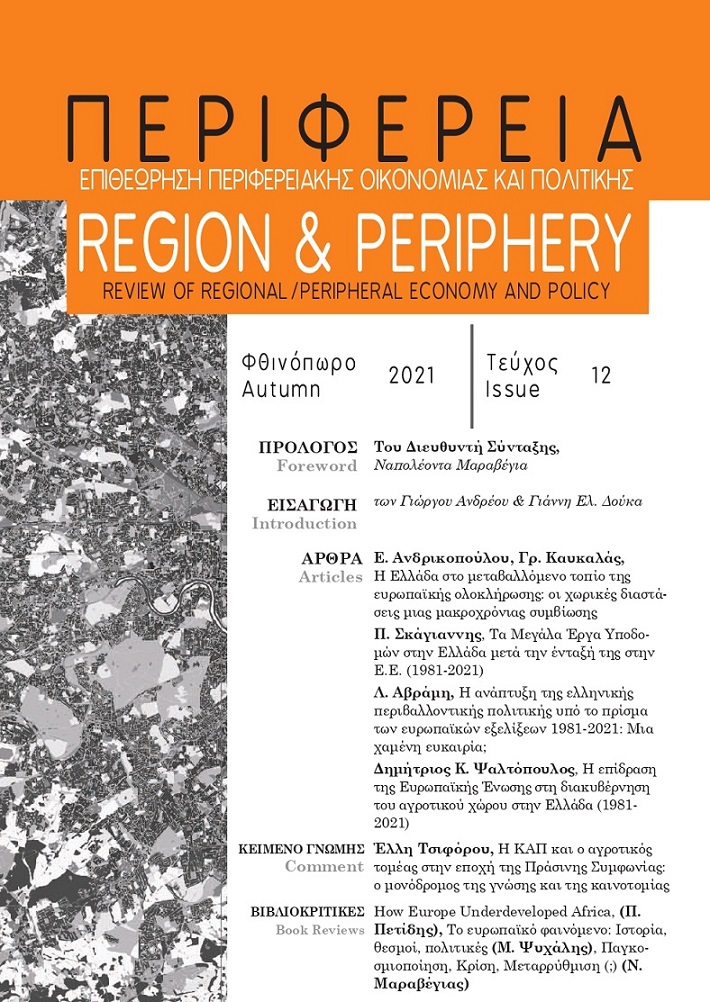Τα Μεγάλα Έργα Υποδομών στην Ελλάδα μετά την ένταξή της στην Ε.Ε. (1981-2021)

Περίληψη
Το κείμενο αποσκοπεί στην επισήμανση της σημασίας της πολυπλοκότητας, της αβεβαιότητας και του ρίσκου στην περίπτωση των μεγάλων έργων, με ειδική αναφορά στην Ελλάδα. Προς τούτο, γίνεται αρχικά μια εννοιολογική θεωρητική τοποθέτηση για τα μεγάλα έργα, αντλώντας από την εμπειρία των σημαντικότερων διεθνών ερευνών επί του θέματος. Οι επιπτώσεις των μεγάλων έργων είναι οικο-περιβαλλοντικές, οικονομικές, κοινωνικές και θεσμικές, πεδία στα οποία εντοπίζεται και η ανάγκη προσδιορισμού εκτίμησης της βιωσιμότητάς τους έναντι της συμβατικής αντίληψης για την ανταπόκρισή τους στο σιδηρούν τρίγωνο των προδιαγραφών, χρονοδιαγραμμάτων, και ορίων του προϋπολογισμού τους. Στο πλαίσιο αυτό τονίζεται η ευαισθησία έναντι των ζητημάτων που εγείρονται για τον χώρο, διερευνάται το εάν έχουν επιτευχθεί οι στόχοι που είχαν τεθεί, ενώ εντοπίζονται ανασχετικοί παράγοντες που ανάγονται στην ανεπαρκή αντιμετώπιση της πολυπλοκότητας - αβεβαιότητας-ρίσκου από την αρχή του σχεδιασμού των έργων. Υπό το φως των ανωτέρω, εξετάζονται κυρίως τρία μεγάλα έργα στην Ελλάδα: η Αττική Οδός, η Γέφυρα Ρίου-Αντιρρίου και το Βασικό Έργο του Αττικού Μετρό, ως χαρακτηριστικά παραδείγματα. Τα έργα αυτά έχουν σε καθοριστικό βαθμό χρηματοδοτηθεί από την Ευρωπαϊκή Ένωση ή και από την Ευρωπαϊκή Τράπεζα Επενδύσεων κατά τη διάρκεια των σαράντα ετών της ένταξης της Ελλάδας στην ΕΟΚ/Ε.Ε. στο πλαίσιο της ευρωπαϊκής περιφερειακής πολιτικής. Στην περίπτωση των έργων αυτών, εκτίθεται ο συγκεκριμένος προβληματισμός για την επιτυχία των στόχων τους και τις επιπτώσεις τους, αλλά και ο γενικότερος προβληματισμός για τη φύση, σημασία και πραγματικότητα των μεγάλων έργων στην Ελλάδα.
Λεπτομέρειες άρθρου
- Πώς να δημιουργήσετε Αναφορές
-
Σκάγιαννης Π. (2021). Τα Μεγάλα Έργα Υποδομών στην Ελλάδα μετά την ένταξή της στην Ε.Ε. (1981-2021). Περιφέρεια | Regional Integration: Politics, Economics, Governance, 12(12), 41–63. https://doi.org/10.12681/rp.28887
- Ενότητα
- Ερευνητικά Άρθρα

Αυτή η εργασία είναι αδειοδοτημένη υπό το CC Αναφορά Δημιουργού – Μη Εμπορική Χρήση 4.0.
Οι συγγραφείς των άρθρων που δημοσιεύονται στο περιοδικό διατηρούν τα δικαιώματα πνευματικής ιδιοκτησίας επί των άρθρων τους, δίνοντας στο περιοδικό το δικαίωμα της πρώτης δημοσίευσης.
Άρθρα που δημοσιεύονται στο περιοδικό διατίθενται με άδεια Creative Commons 4.0 Non Commercial και σύμφωνα με την άδεια μπορούν να χρησιμοποιούνται ελεύθερα, με αναφορά στο/στη συγγραφέα και στην πρώτη δημοσίευση για μη κερδοσκοπικούς σκοπούς.
Οι συγγραφείς μπορούν να καταθέσουν το άρθρο σε ιδρυματικό ή άλλο αποθετήριο ή/και να το δημοσιεύσουν σε άλλη έκδοση, με υποχρεωτική την αναφορά πρώτης δημοσίευσης στο περιοδικό Περιφέρεια.
Οι συγγραφείς ενθαρρύνονται να καταθέσουν σε αποθετήριο ή να δημοσιεύσουν την εργασία τους στο διαδίκτυο πριν ή κατά τη διαδικασία υποβολής και αξιολόγησής της.


